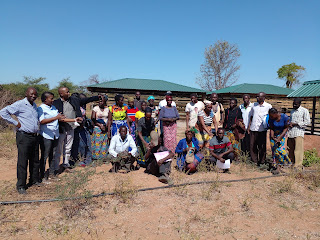By HAPPY MULOLANI
LUSITU is a rural outpost
located 35kilometres west of Chirundu district of Southern province. It is
known to be in the valley where the area experiences high temperatures, as it
is positioned in Region I of the Zambia Agro-Ecological Zone.
By virtue of its location
in the valley, access to reliable water sources for livestock farmers has been one
of the detrimental factors in their livestock value chain.
Chairperson of Manzoomwa
Farming As A Business School (FaaBS), Alick Malunga confirmed that farmers in
the area lacked access to reliable water sources as they drew water from the
seasonal Lusitu stream, which easily dried up, they also did not have adequate
land to rear their goats neither did they have modern goat housing structures.
Mr Malunga, who is also a
livestock farmer, owns 35 goats. He attests to unreliable access to water
supply due to dryness of the area and lack of improved goats.
“We were also rearing
local goat breeds which have low market value,” Mr Malunga disclosed.
These challenges contributed
to the low pricing of goats on the market, which did not yield a return on
their efforts. This provided an opportunity for the Enhanced Smallholder
Agribusiness Promotion Programme (E-SAPP) to empower the smallholder farmers in
organised groups, using the programme’s approach – Farming As A Business
Schools. This approach enabled smallholder farmers to undergo livestock
training and better methods of rearing goats for a season. Through four FaaBS,
a total 417 smallholder farmers were trained in the livestock value chain. After
which they were assessed and qualified for financing under the programme’s
Matching Grant facility (MGF) of a total K1,400,000.
Of the approved funds, K615,000
was released towards the group’s first milestone coupled with their contribution,
which went towards one solar panel, a borehole, two goat housing units, dip
tank and the construction of a manager’s house. While the group will work
towards the construction of a classroom and marketing slab once the additional
funds are released for the remainder of the milestones they envision to
undertake.
Mr Malunga disclosed that
the support rendered to the farmers has enabled the four FaaBS put up a goat
breeding centre with a production capacity of 200 goats for the two goat
housing units already erected.
He says it is pacifying
that the group through FaaBS, learnt about the importance of accessing improved
goat breeds and management, thereby resulting in improved quality of goats and
higher market value.
“Previously, a local goat
was being sold at K150 but with improved breeds, the market price will increase
to about K400, which is currently the range of prevailing market price and is a
good return on farmers’ efforts,” Mr Malunga said.
He is glad that the water
challenge has been resolved. This means the breeding centre can integrate with
other activities such as gardening which require constant supply of water.
“At first, two dry
boreholes were sunk, until a third borehole where we have found water at a
depth of 90metres,” Mr Malunga sighed with relief.
It is encouraging that
the initiative to come up with a goat breeding centre has stimulated interest
among the traditional leadership, who immediately offered some tracts of land
to set-up the breeding centre.
“Three Village Headmen
offered land for the goat breeding centre. Village Headman Mungomba, Village
Headman Siamwanjwa and Senior Headman Kwelele, who is the Chief’s
representative collectively offered 54 hectares to set-up the goat breeding
centre,” Mr Malunga revealed.
He explained that they
offered the land through a letter of endorsement, which facilitated legalising of
the land and also submission of plans for the proposed structure.
Speaking on behalf of the
traditional leadership, Village Headman Mungomba expressed happiness that for a
long time, farmers in the area lacked the basic facilities to boost their goat
production capacities which affected their households’ food security and
incomes.
Headman Mungomba
reiterated that farmers need to take advantage of the breeding centre as they
work towards expanding the facility in view of the ever increasing demand for
goats.
E-SAPP Livestock
Specialist, Lemmy Munsanje pointed out that the 54hectares of land allocated to
the farmers by the traditional leadership was a good gesture as it was aimed at
empowering the local farmers.
However, consideration
should be made to increase more land to the breeding centre, as once its fully
functional, the land may get smaller. Suffice to state that increasing land for
such a productive venture will positively impact on the livelihoods in the
area.
Senior Livestock
Production Officer for Lusaka province, Bwalya Tembo pointed out that farmers
needed to take into account the climatic changes and avoid the indiscriminate
cutting of trees, as this can affect their environment.
Ms Tembo said it was
necessary for farmers to engage in tree planting wherever trees had been cut to
avert any effects such as deforestation.
Whereas, E-SAPP Nutrition
Specialist, Nalukui Sakala encouraged farmers to practise gardening within the
confines of the breeding centre in order to uplift their nutrition status.
“She also called for
active participation of women and youth in the livestock value chain as this will
increase their nutrition status and incomes,” Ms Sakala said.
In essence, the
programme’s FaaBS approach has worked progressively in resolving some
smallholder farmers’ bottlenecks in Lusitu such as access to water, improved
breeds and their management. Eventually, this improves their quality of goats
which will enable them bargain for a higher price and an organised market.


No comments:
Post a Comment